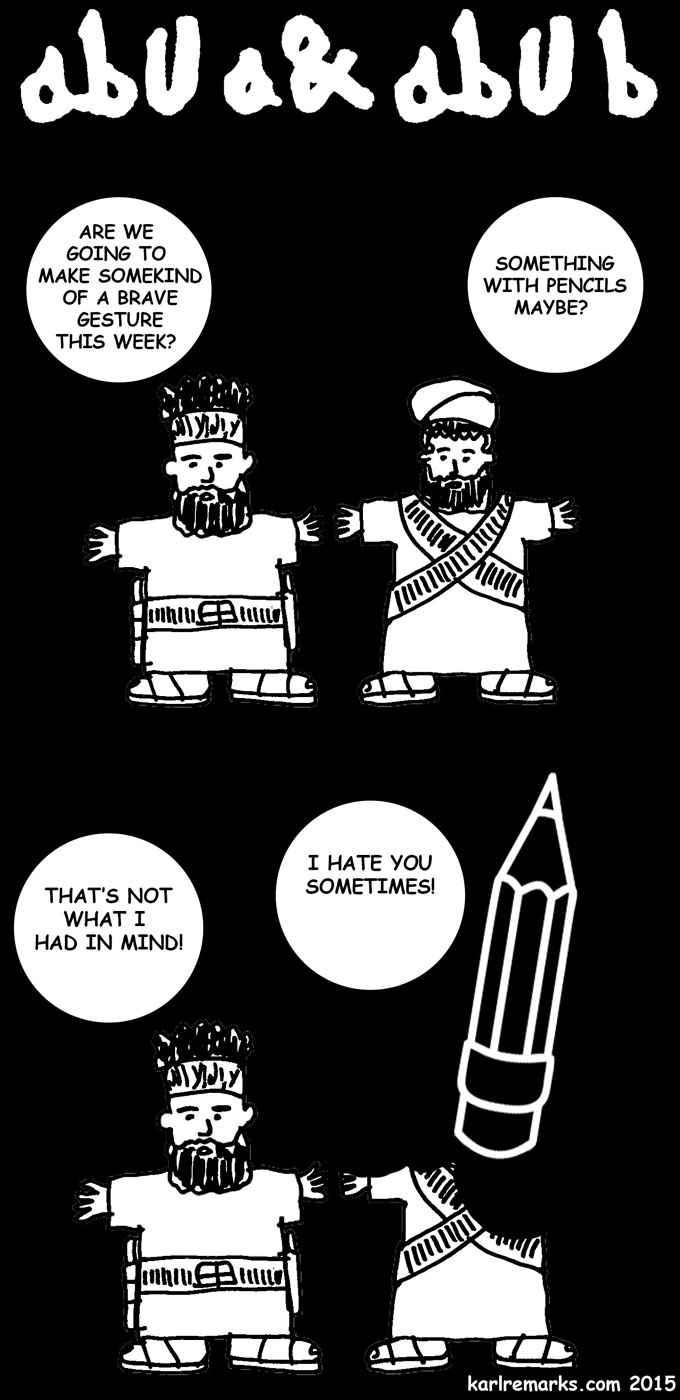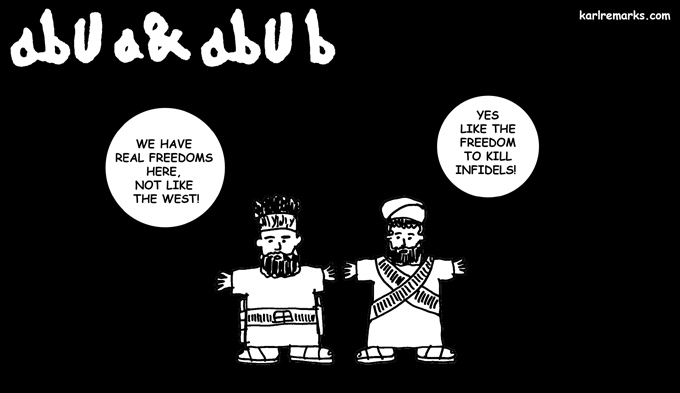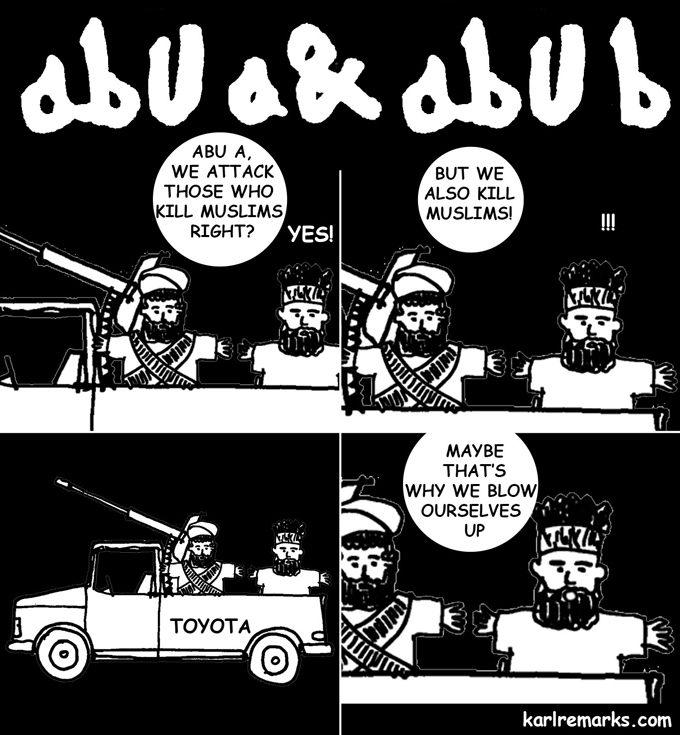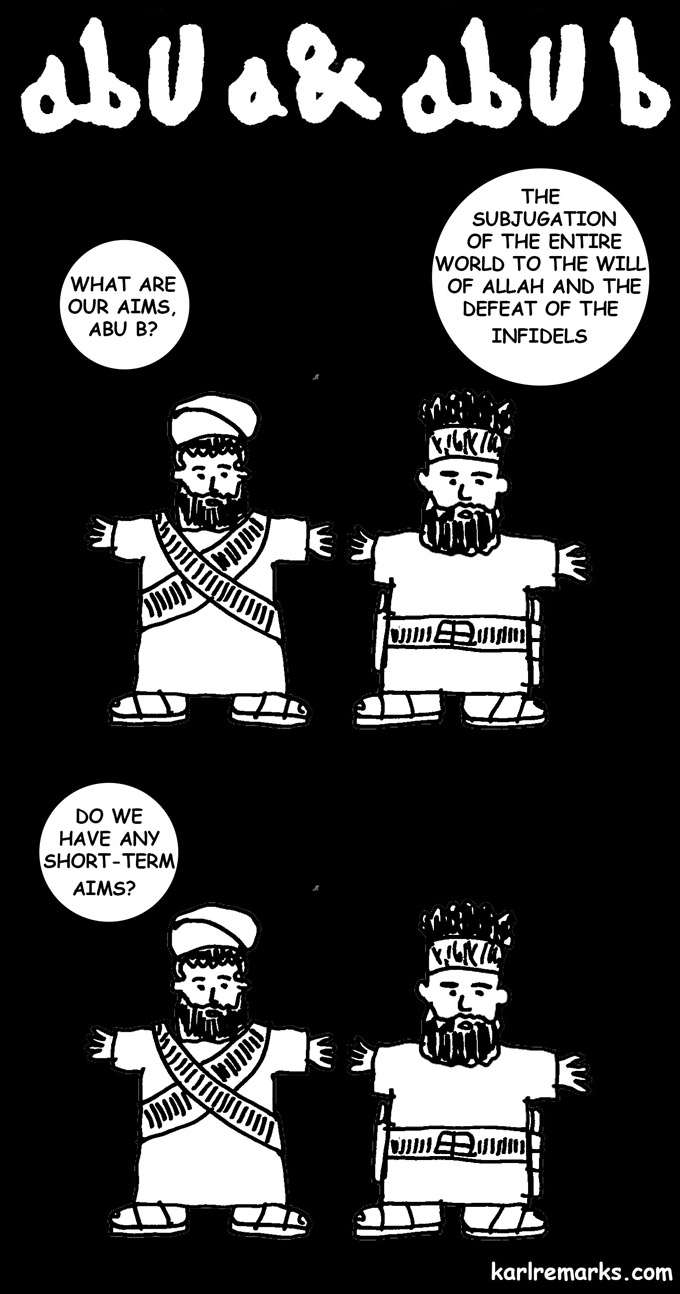
In the wake of the attacks on Charlie Hebdo’s offices in Paris, my two jihadi cartoon characters, Abu A and Abu B, got together to discuss the incident. They did so of their own free will, without any prompting from me, but I was intrigued by the conversation. I decided to record it for those interested in hearing the opinions of two jihadi cartoon characters.
Abu A: Abu B, did you hear about the attacks in Paris?
Abu B: Thank God. I am pleased.
Abu A: I know, but we are cartoons also. Aren’t you upset?
Abu B: That’s what makes this so difficult.
Abu A: Are we jihadis first or are we cartoons first? My loyalties are divided.
Abu B: But do we have a say in this? He created us after all.
Abu A: He’s just a cartoonist. God is the true creator.
Abu B: Would a jihadi say God rather than Allah?
Abu A: You’re splitting hairs.
Abu B: Yeah, we never do that. And if you ask me, he’s a terrible cartoonist anyway.
Abu A: I have always thought that he draws us like this intentionally, to emphasize our infantile rage.
Abu B: Sounds like an excuse to me. Anyway drawing people is haram.
Abu A: But we are cartoons. Are you arguing that we shouldn’t exist? That strikes me as nihilistic.
Abu B: And we’re not nihilistic?
Abu A: Come on, a real jihadi would never say that.
Abu B: Yes, but the point is that he uses us as a device; he makes us say things he wants to say.
Abu A: I am not sure I am comfortable with this. It does deny us agency.
Abu B: Left-liberals deny us agency as well; they claim we are driven by a righteous rage and sense of injustice.
Abu A: The fools.

Abu B: I think they envy our sense of purpose.
Abu A: You’re just shamelessly plagiarizing Žižek now.
Abu B: This conversation sounds really implausible. When would jihadis ever discuss Žižek?
Abu A: It’s just a comic device.
Abu B: I don’t find it funny; it also alienates people who are not familiar with Žižek.
Abu A: It’s not ha-ha funny; it’s subtle funny. More of a comment.
Abu B: I don’t buy it. Now a man slipping on a banana skin—that’s funny.
Abu A: He did try slapstick once, when the training suicide vest I was wearing blew up.
Abu B: I really don’t think slapstick is the right medium to satirize jihadis.
Abu A: I wouldn’t have thought cartoons are either.
Abu B: That’s just navel-gazing. We’re here to do a job.
Abu A: But how effective are cartoons at dealing with these complex issues?

Abu B: Actual jihadis aren’t even outraged by them.
Abu A: I think he prefers not to attract that kind of attention anyway.
Abu B: Maybe this will change. Maybe this is a revolutionary thing for cartoons to do—reflect on their own existence.
Abu A: I think it’s self-indulgent. Do you see Superman doing that?
Abu B: Superman is a proper superhero, and he’s colored in and everything. We’re black and white and two-dimensional. We don’t even have shadows.
Abu A: Regardless, the point is, do cartoons change anything? Are they effective?
Abu B: I really don’t think that’s the point of cartoons.
Abu A: They can make people very angry.
Abu B: You’re forcing the issue blatantly now. Are you trying to be topical?
Abu A: Look, how often do we get a chance to reflect on our own being as cartoons? And I won’t lie: it’s in the news; people are interested. We can make a difference here.
Abu B: I honestly don’t think this is the job of cartoon characters. Why don’t people read philosophers or writers? Why do they want to hear what our opinion is?

Abu A: There’s a general narrative exhaustion. We’re tapping into a moment full of uncertainty and intellectual fatigue.
Abu B: That’s really far-fetched; you don’t strike me as the kind of cartoon character who would say something so profound.
Abu A: It’s just an ironic device; people will recognize it for what it is.
Abu B: Why doesn’t he draw a powerful cartoon? Like just a black background—that would be very symbolic and powerful.
Abu A: Next you’ll say some blood drops also.… It’s a cliché.
Abu B: But we are clichés! Cartoons are clichés! People aren’t meant to take them literally.
Abu A: Again with the preaching … it’s too blatant. We have to be more subtle.
Abu B: We do or he does?
Abu A: I think he’s putting words in our mouths because he doesn’t want to say them directly.
Abu B: This is going nowhere. I have other things to do.
Abu A: No, we both know you don’t. You’re just being evasive.
Abu B: This is too Brechtian for my liking.
Abu A: We really stretched the limits of credibility. But I think we said some important things.
Abu B: I don’t know. Let’s see how many shares it gets on Twitter.
This piece was commissioned and edited by our regional editor Sheyma Buali.

